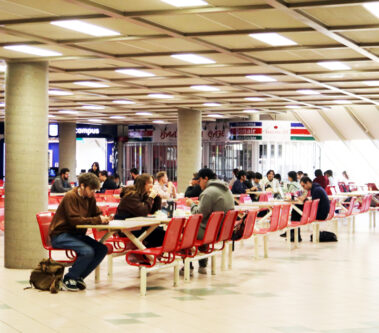Program for starving students — literally
By Lethbridge Herald on October 4, 2025.
 Students take a break from their studies at one of the university's food courts Friday afternoon. For those living on campus, the Residence Life team developed a new Resident Emergency Food Fund to help students keep their stomachs full.
Students take a break from their studies at one of the university's food courts Friday afternoon. For those living on campus, the Residence Life team developed a new Resident Emergency Food Fund to help students keep their stomachs full.Alejandra Pulido-Guzman
Lethbridge Herald
With life being so expensive these days, some students find themselves struggling to keep their stomachs full while trying to balance their studies and finances. But those living in residence at the University of Lethbridge now have access to emergency food supplies, thanks to a grant from the Food for Thought committee.
The Resident Emergency Food Fund (REFF) was developed by the Residence Life team in response to reports of food going missing from communal fridges and students asking what type of resources were on campus to help them with food insecurity.
Shanna Brown, campus life housing co-ordinator says that within the last year they have identified a lot of food insecurity within residents and many students struggling.
“The Resident Emergency Food Fund started because we didn’t have anything established for residents’ food insecurity,” says Brown.
She explains that while first-year students living in residence are required to be on a dining plan, making the plan last the entire academic year can be a challenging task for students living away from home for the first time.
“They are going through it at a quicker rate, and this has increased their usage of our food pantries around campus, the food for thought initiatives,” says Brown.
The team applied to the Food for Thought committee and received a $2,500 grant, which will provide grocery store gift cards and meal vouchers for the Chartwells food outlets on campus.
“Any student whether they are living in first-year residence or continuing residence and regardless of their income, are eligible to apply at any point with no questions asked,” says Brown.
She says it’s a temporary fix, but they hope they can plan for a long-term solution with those applying for the help.
To access the program, students will be asked to fill out an application form and meet with a member of the Residence Life team, who will determine the long-term support needs.
Along with the short-term support of a grocery card or food voucher, students will get help with long-term planning, resources, and referrals.
Additional Food for Thought programming for students includes The Bodega, a food-sharing hub where students can pick up snacks, non-perishables, hygiene products and gently used kitchenware items, as well as food literacy workshops, free fresh produce events and the Campus Roots Community Garden.
Alejandro Figueroa, president of the Student’s Union says it is important to be able to have the Resident Emergency Food Fund as affordability is a main concern for students at the university.
“Having that fund available for students living in residence allows us to free up some resources at the Food Bodega as we see it being utilized very often,” says Figueroa.
He explains that since the Food Bodega is open for all students on campus, being able to help those in residence with something specifically tailored to them, helps the other students who rely on the Food Bodega and do not live on campus.
17-16



Learning to budget starts from the home. Kids these days do not have the means or capabilities of budgeting, whether food or finances, and then they wonder why they struggle? How about implementing life skills classes in junior and high school levels? We learn everything about the skills we need for a career or trade, but we can’t put two cents together away in our savings? (figure of speech). Career and Life Management courses were taught in my days. Now, while I don’t recall exactly the topics, but it should include budgeting, saving, landlord tenant act, economics, etc etc. By college/university, it’s almost too little too late because they are focused on everything else. Start with the root of the problem, not the fruit of the problem
Agree. Was just over there on career day. Line up at Hortons long and 10 orders on the board. Their choice.